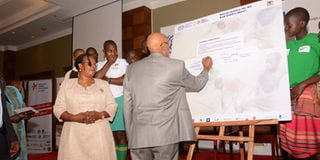Prime
Address causes of child labour, UNICEF boss tasks govt

UNICEF Uganda Country representative Mr Munir A Safieldin signs on a commitment board against child labour as Minister of State for Youth and Children Affairs Sarah Mateke looks on. Photo | Mike Sebalu
What you need to know:
- According to Mr Munir, additional resources are required as commitments from the government, development partners, and NGOs to combat child labour
The United Nations International Children's Emergency Fund (UNICEF) Uganda Country representative Mr Munir Safieldin has asked the government to avail resources if the challenges of child labour are to be addressed.
According to Mr Munir, additional resources are required as commitments from the government, development partners, and NGOs to combat child labour.
“At the moment, to address child labour in a very clear way requires resources. Resources are needed for the social sector. Unfortunately, in the current budget debate, the budget for the social sector is very being reduced. It’s not good news for any one of us. It’s not good news for the education sector, it’s not good news for the health sector, and definitely not good news for the Ministry of Gender. Many cuts are happening now even for the essential stuff that the Ministry needs to follow up on many issues including child labour,” Mr Munir said during celebrations to mark the World Day against Child Labour, at Sheraton hotel in Kampala on Monday under the theme; social justice for all; end child labour.
“I had a meeting with the budget committee in Parliament, they have been saying it’s a bit late to make changes in the budget but I think there is still an opportunity to make sure that even if it’s not today, during the course of the year, more money will be allocated to the social sector, otherwise, without resources we cannot combat child labour,” he added.
According to the International Labour Organization (ILO) UNICEF 2016-2020 Survey, the global estimate indicates that 160 million children aged 5-17 were engaged in child labour and 1 in 10 children is involved in child labour.
In the same report, 79 million children are in hazardous work endangering their health, safety and moral development.
The survey further established that 86.6 per cent of the children in child labour are in Sub-Saharan Africa and remains concentrated primarily in agriculture.
According to the ILO global estimates, 92 million children; 40 million girls and 42 million boys were engaged in Child labour in Africa at the beginning of 2020 accounting for 1 in 5 of all children in Africa (21.6 per cent).
Mr Munir added that child labour is a crime against children because it deprives them of the opportunity to develop mentally, emotionally and physically and deprives them of the bright future that they are looking for.
Ms Beatrice Aciro, the Deputy Chair, of the Central Organization of Free Trade Unions (COFTU), said the interventions of withdrawing children from child labour seem not to address problems facing their families hence the need for alternative realistic support.
“In the different parts of Uganda, parents and children working in the same mines, and quarries acknowledge the work as hazardous but they view it as a necessary response to extreme poverty. On the other hand, children may be better off accompanying their parents than being left alone at home and in the long run get used and think it’s a good job since their parents are paid for it whereas it is not,” she said.
She, therefore, called for an urgent need for measures to reduce poverty and provide safety nets for children living with families facing a crisis.
The Permanent Secretary Ministry of Gender, Labour and Social Development Mr Aggrey Kibenge said the government is thinking of strengthening policies related to education like both Universal Primary and Secondary Education to ensure that all school-going children attend and remain in schools to prevent child labour.




